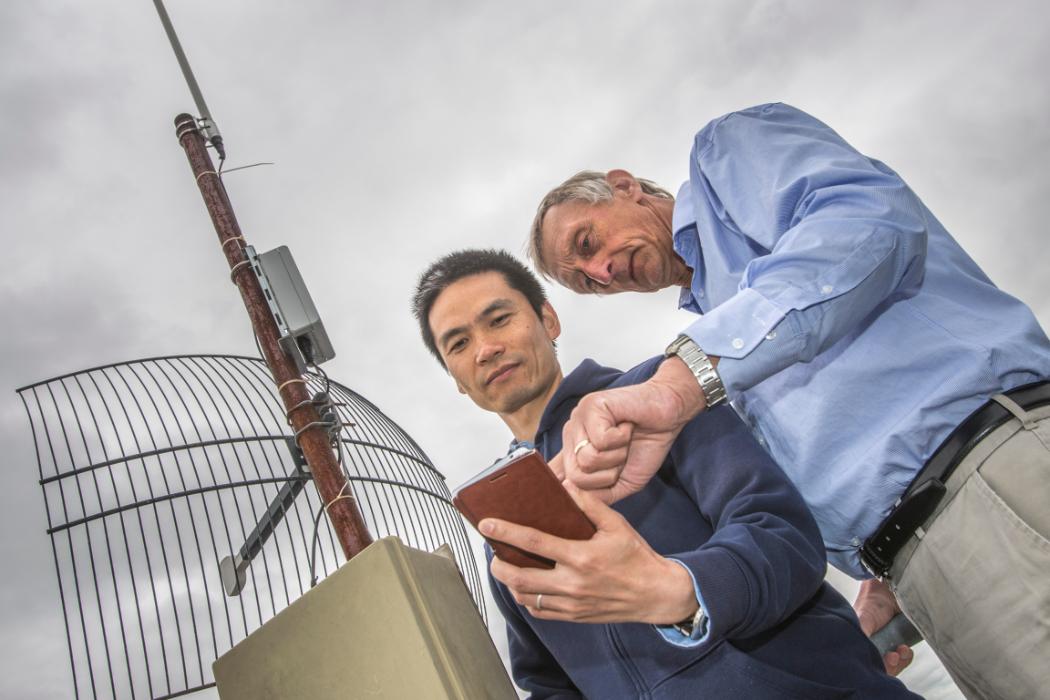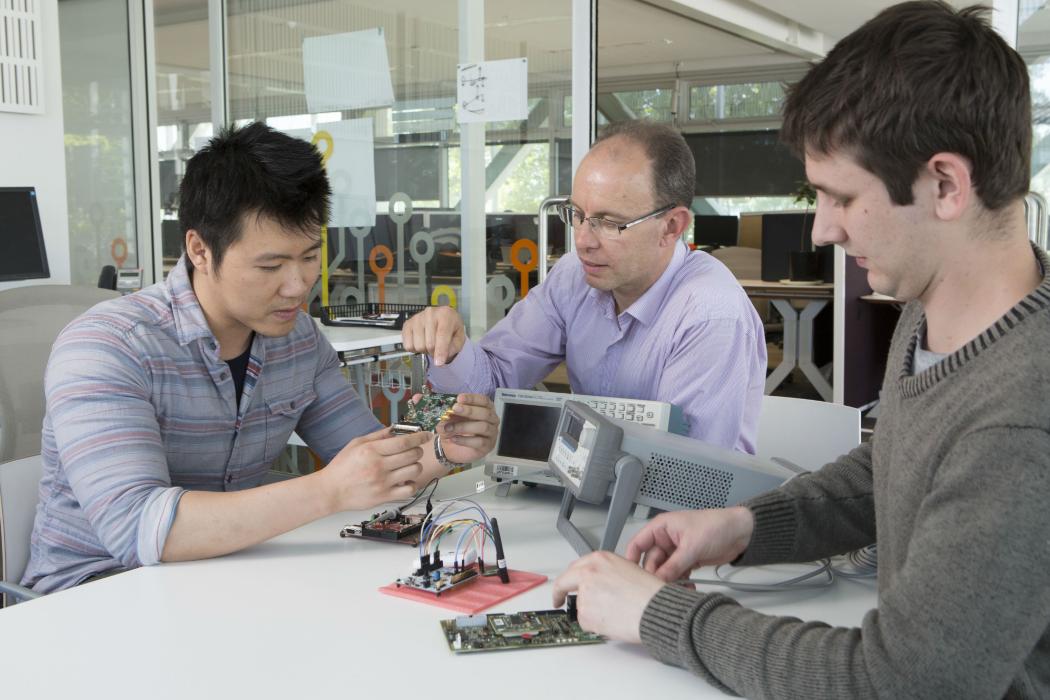WRC conducts groundbreaking, industry-driven research in wireless communications. Here you can find information on some of our main research areas.
MIMO and diversity techniques
What is MIMO?
MIMO (multiple input, multiple output) is an antenna technology for wireless communications where multiple antennae are combined to minimise errors and optimise speed. MIMO is a fast-moving and exciting area of research. Diversity techniques use two or more antennas to improve the quality and reliability of a wireless link.
What does WRC do in MIMO?
WRC looks at techniques that overcome limitations of the faded-channel to increases in throughput. Areas of interest in these fields are multi-user detection, space-time coding, transmitter and receiver diversity, smart antennae and beam forming solutions.
Sample research and projects
- Time and frequency constrained MIMO waveform design, ongoing.
- Orthogonal pilot signals to coexist with MIMO signal ramp-up, 2015.
- Cheng Yu Andy Shang, ME research, Linear transceivers for MIMO relays, 2014.
- Yu-An Chen, ME research, A low complexity method of resource allocation in up-link macrodiversity systems using long-term power, 2013.
- Xiaohan Sasha Wang, ME research, Investigation of Forward Error Correction Coding Schemes for a Broadcast Communication System, 2013.
Key WRC staff
Software defined radio
What is software defined radio?
Software defined radio is where components usually implemented in hardware such as mixers and amplifiers are instead implemented by software on computers or embedded systems.
What does WRC do in software defined radio?
WRC explores different areas of software defined radio including cognitive radio, a form of wireless communication where a transceiver can detect which channels are in use and move to vacant ones.
Sample research and projects
- Application of software defined radio for airborne embedded systems, ongoing.
- Implementation of novel covert chaotic communication system in real time, 2016.
- Applying a diversity method to the USRP platform, 2010.
Key WRC staff
OFDM and high data rate modulations
What is OFDM?
OFDM (Orthogonal frequency-division multiplexing) is is a method of encoding digital data on multiple frequencies to carry data on several parallel data streams or channels. Multi-carrier modulations such as ODFM are becoming common in many telecommunications standards.
What does WRC do in OFDM?
WRC is researching the implementation of multi-carrier modulations such as OFDM and how to increase its performance.
Sample research and projects
- Novel OFDM-like waveforms for 5G, ongoing.
- Tri Pham, Tho Le-Ngoc, Graeme Woodward, Phillipa A Martin, and Khoa Tran Phan, Equalization for MIMO-OFDM systems with insufficient cyclic prefix. Nanjing, China: IEEE 83rd Vehicular Technology Conference, 2016.
- Tri Pham, Graeme Woodward, and Phillipa A Martin, Channel Estimation and Data Detection for Insufficient Cyclic Prefix SIMO-OFDM with Pilot Sub-carriers. Melbourne, Australia: Australian Communication Theory Workshop (AusCTW), 2016.
- Tri Pham, Tho Le-Ngoc, Graeme Woodward and Phillipa A Martin, Channel Estimation and Data Detection for Insufficient Cyclic Prefix MIMO-OFDM. IEEE Transactions on Vehicular Technology, 2016.
- OFDM physical layer system design, 2014.
Key WRC staff
Sensor networking and the Internet of Things
What is sensor networking and the Internet of Things?
Sensor networks are networks of sensors that collect data across wide areas, sometimes from very remote locations, that monitor physical or environmental conditions and pass their data to a main location.
The Internet of Things (IoT) is the network of physical devices, vehicles, buildings and other items embedded with electronics, software, sensors and network connectivity that enable them to collect and exchange data.
What is WRC doing in sensor networking and the Internet of Things?
Solutions for collecting environmental data, power distribution grid data, data to support precision agriculture/primary industry from remote locations.
Sample research and projects
- Integration of LPWA into delay-tolerant networks, ongoing.
- Evaluation of LoRa, 2016.
- Xiaojun Zhu, Guihai Chen, Shaojie Tang, Xiaobing Wu and Bing Chen, Fast Approximation Algorithm for Maximum Lifetime Aggregation Trees in Wireless Sensor Networks, 2016.
- Xiaohan Wang, Andreas Willig and Graeme Woodward. Improving Fountain Codes for Short Message Lengths by Adding Memory, IEEE Eighth International Conference on Intelligent Sensors, Melbourne, Australia, 2013.
Key WRC staff
Mission critical communications and resilient networks
What are mission critical communications and resilient networks?
Understanding network vulnerabilities and designing information and communications technologies to improve their resilience.
What does WRC do in mission critical communications and resilient networks?
WRC has developed award-winning solutions in collaboration with Tait Communications in remote wireless network communications for emergency services and utility response teams.
Sample research and projects
- Mission critical applications and standards, ongoing.
- Network design and planning for mission critical communications, 2016.
- Broadband technologies for public safety systems, 2015.
- Human factors in mission critical communications, 2015.
Key WRC staff
Check out the WRC's research on UC Repository




